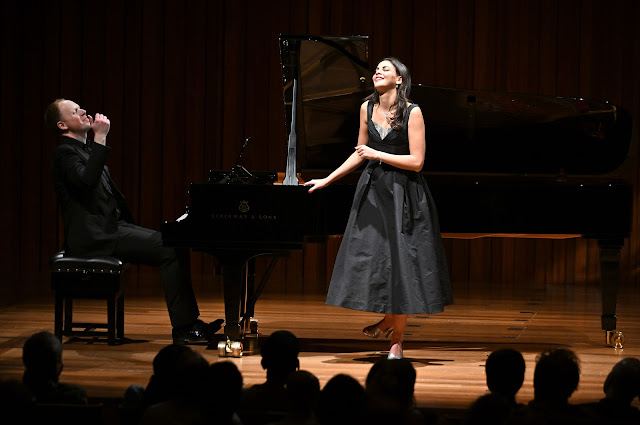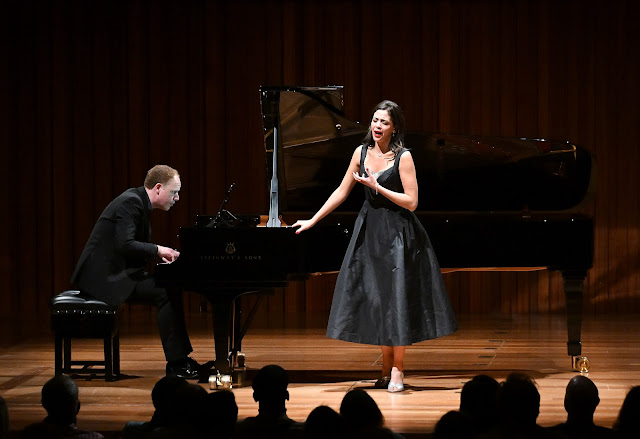 |
| Joseph Middleton and Fatma Said – Milton Court concert hall, Barbican (Photo: Mark Allan / Barbican) |
Mozart, Schubert, Schumann, de Falla: Siete canciones populares, Obradors, Najib Hankash; Fatma Said, Joseph Middleton; Milton Court concert hall, Barbican
Reviewed 22 May 2024
A consummate programme where two exceptional performers took us on a journey and held us spell-bound from beginning to end, weaving seemingly disparate elements into something remarkable
On paper, the programme for soprano Fatma Said and pianist Joseph Middleton‘s recital at Milton Court concert hall, as part of the Barbican Centre‘s classical season, looked interesting but not out of the ordinary; songs by Mozart, Schubert and Schumann in the first half, songs by de Falla, including Siete canciones populares, and Obradors in the second, and ending with a song by Lebanese composer Najib Hankash, all linked by the rather loose idea of love in all its forms. But in the hands of a pair of exceptional performers, this sequence was transformed into something that bit special.
For a start, Said sang everything from memory, addressing us in each song and successfully capturing attention from the recital’s opening notes. There was nothing overly operatic about her approach, yet each song had a narrative, a character, presented in music, word and gesture. In this she was partnered by Middleton, whose playing was sensitive but not retiring and more than once I notice the vividness with which he contributed to supporting Said.
 |
| Joseph Middleton and Fatma Said – Milton Court concert hall, Barbican (Photo: Mark Allan / Barbican) |
We began with Mozart, and for once there was nothing politely charming about these songs, they became vividly alive and clear predecessors of great songs by composer such as Schubert. Als Luise die Briefe ihres Liebhabers verbrannte, about a young woman burning a man’s letters, had the quality of a dramatic recitative (the song shares some material with Don Giovanni), but is woefully short and this performance certainly left you wanting more. Abendempfindung (Evening Thoughts), by contrast, was lyric and interior, intensely felt with a lovely fragility in the voice. Der Zauberer (the Magician) mixed in humour too, and the performance was so vividly done that you entirely forgot you were listening to a strophic song.
With Schubert’s Rastlose Liebe (Restless Love) we are jumping forward less than 25 years, Schubert wrote the song in 1815. Here, Said was intense, the performance fast and vibrant with Middleton’s strongly characterised piano matching her. Nachtviolen (Dame’s Violets) was intimate, thoughtful and tender. There was a strong sense of identification with each song, Said telling the story and projecting emotions. I have to confess that I have always had a bit of a problem with Ganymed, the text and treatment seem to far from the treatment of the young boy in the myth. But if you accept the song as something in its own right, then Said brought a poised sense of wonder to the opening. She and Middleton then travelled through the protagonist’s detailed emotions, becoming more urgent and ending in modified rapture. The Schubert group finished with Ständchen from Schwanengesang, interior and concentrated yet capturing the protagonist’s strong emotions, this was far more than simply a lovely melody.
We then moved on to Schumann, beginning with Meine Rose from Sechs Gedichte von Nikolaus Lenau und Requiem. Middleton’s piano had an almost classical style to it and Said’s conversational approach to the song felt as if we started in media res, as she brought great freedom to the expression of romantic feeling. Then Mond meiner Seele Liebling (Moon, my soul’s beloved) from Sieben Lieder was interior and felt like a very personal discussion. Liebeslied (Lovesong) from Lieder und Gesänge, Vol 2 was a sheer romantic outpouring flowing and intense, whilst by contrast Singet nicht mit Trauertönen (Do not sing in mournful tones) from Lieder und Gesänge aus Wilhelm Meister was highly characterful, Middleton’s piano almost perky, the two creating something delightful. The first half ended with the warm overlowing of intense feeling of Widmung (Dedication) from Myrthen, with Said creating the physical and emotional embodiment of the music.
The second half was a complete contrast as we moved from the German lied to something more Mediterranean. Manuel de Falla’s Siete canciones populares are arrangements of existing folksongs, each short and intensely characterful and it is fatally easy for a performer to fall into the conventional caricature Spanishisms but there was none of that here. Said and Middleton took the songs at face value, Middleton giving wonderfully vibrant accounts of the piano part with lots of strong rhythms and complementing Said’s direct approach, making you think of the original folk origins and performers.
El paño moruno (The Moorish Cloth) was sober yet richly toned, whilst Seguidilla was fast yet highly contained and rather poised. Middleton’s quietly intense piano playing in Asturiana made you think of Debussy, whilst Said’s deeply felt performance was interior and quietly mesmerising. Jota moved from strong piano rhythms and rich characterisation to something more evocative, then Nana (Lullaby) began with a fantastic web of piano sound as a backdrop for Said’s hauntingly plangent toners. Cancion was perky and wonderfully richly characteristed, and we ended with Polo, fast and vibrant, yet intense.
One more Falla song followed, Tus Ojillos Negros (Your Dark Eyes), an essay in extended melancholy that was quiet yet intense. The poem, by Cristobal de Castro is rather wordy, yet Said made it full of meaning. The group ended with one more Spanish folksong, this time arranged by Fernando Obradors. Del cabello más sutil (From the finest hair) comes from his from Canciones clásicas españolas, four volumes of songs based on Spanish poetry and folk melodies. This was all lyrical beauty with a flowing piano part (that Jessica Duchen’s booklet article suggested evoked the beloved’s ‘long, alluring tresses’). Pure magic.
We ended with a song from Said’s native Lebanon. Najib Hankash (1904-1977) in fact lived for some years in Brazil. His song Aatini al Naya Wa ghanni (Give me a flute ‘ney’ and sing) was written in 1964 for Fairuz, Lebanon’s most celebrated singer, and sets a poem by Khalil Gibran. There wasn’t much of Brazil here, the music really did evoke the sounds of the Middle East and Said’s expressive way with the language was pure magic, the whole finely haunting and making you want more.
I could happily have listened to Said and Middleton performing more Falla and Hankash, perhaps another time. The art of a good recital is perhaps knowing when to stop, and here we came to a more than satisfying conclusion. From first to last, Said and Middleton had held us as they took us on this journey, ‘From Leipzig to Lebanon and from Vienna to Andalucia’ as Duchen’s article put it.
The audience was, rightly, most appreciative and we were treated to an encore, Jerome Kerne’s The Way You Look Tonight (written for Fred Astaire for the 1936 film, Swing Time).
Never miss out on future posts by following us
The blog is free, but I’d be delighted if you were to show your appreciation by buying me a coffee.
Elsewhere on this blog
- Thomas Roseingrave: Eight Harpsichord Suites and other keyboard works – record review
- International Handel Festival, Göttingen
- Combining disparate sounds with a bit of magic: Michel Godard and serpent in Göttingen – concert review
- Göttingen 1853: Johannes Brahms & Joseph Joachim, a meeting of musical minds evoked – concert review
- Quite a Summer: Tom Fetherstonhaugh and Fantasia Orchestra have three festival debuts including the BBC Proms – interview
- Dresden Music Festival
- The results were indeed glorious: Klaus Mäkelä and the Royal Concertgebouw Orchestra in Bruckner – concert review
- The journey continues: Dresden’s historically informed Ring returns with a revelatory Die Walküre – opera review
- Mozart in 1774: Samantha Clarke, Jane Gower, The Mozartists, and Ian Page on stylish form at Wigmore Hall – interview
- Vigour, energy & joy: A Choral Celebration of Queen Mary II from choirs of Royal Hospital Chelsea & Old Royal Naval College – concert review
- A neglected gem revived: New Sussex Opera in Lampe’s The Dragon of Wantley combining historic style and 1980s politics – opera review
- Lobesgesang: Mendelssohn’s rarely performed symphony-cantata is a fine climax to Sir Andras Schiff and the OAE’s exploration of the composer’s symphonic music – concert review
- Fear no more: Brindley Sherratt on releasing his first recital disc – interview
- A German in Venice: Schütz alongside music he could have heard in Venice, a wonderfully life-affirming disc – record review
- Home





%20Sasha%20Gusov.JPG.jpg?w=160&resize=160,160&ssl=1)



